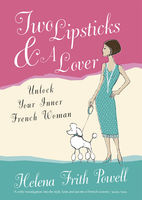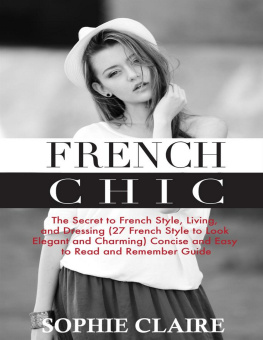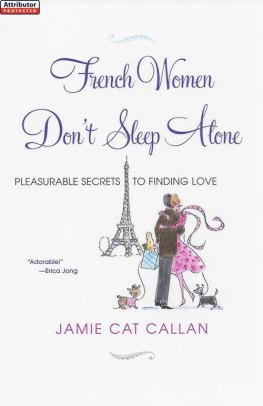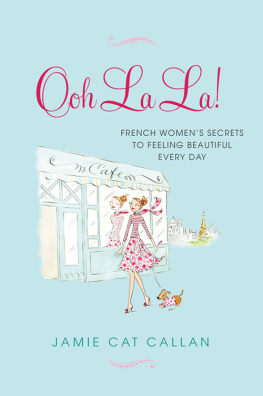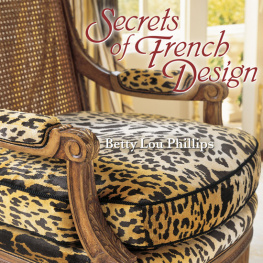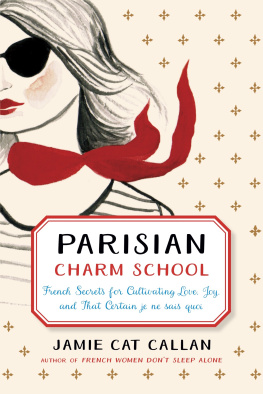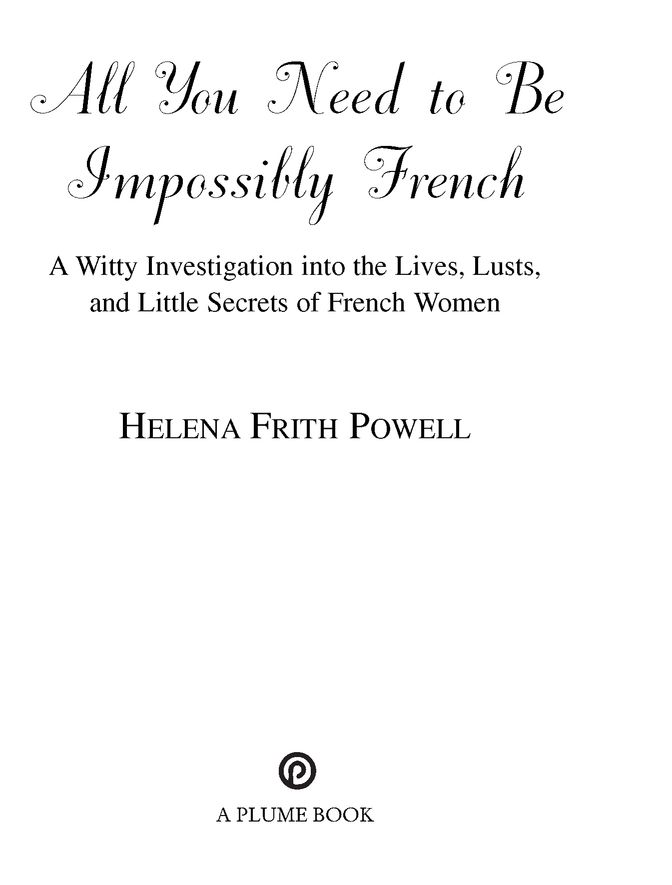Table of Contents
A PLUME BOOK
ALL YOU NEED TO BE IMPOSSIBLY FRENCH
HELENA FRITH POWELL is a regular contributor to the Sunday Times (London), as well as the Daily Mail (London), the Sunday Telegraph (London), the Tatler, Harpers & Queen, and The Independent on Sunday (London). She lives with her husband and their five children in the Languedoc region of the south of France.
ALSO BY HELENA FRITH POWELL
More France Please
For Olivia and Bea,
French women of the future.
Two Lipsticks ...
The first time I visited Paris I stayed with a dancer come stripper who worked at the Lido Nightclub. I was twelve years old. My father, in those days still a handsome charmer, had arranged to meet me there for the Easter holidays. He lived in Italy but was travelling to meet me via the South of France. When I arrived at his hotel in Paris, I was told he was not there, but that the concierge had a telegram for me. It was from him: Have been delayed by a bottom in St Tropez. Call Sophie. Stay with her until I get there. I asked the concierge to call the number on the telegram and spoke to Sophie. She told me that my father had arranged everything with her and to get a taxi to an address which she gave to the concierge.
I was furious when I got into the cab. What was he thinking sending me off to some woman I had never met? Who was she anyway? Undoubtedly another one of his many girlfriends. My parents had been divorced for years, but his libertine behaviour maddened me nonetheless. When I got there, Sophie was waiting outside her apartment on the rue du Bac. She must have been in her early twenties, but to me she looked incredibly grown up and glamorous. She was tall and thin, her dark hair cut in a classic Parisian-style bobbed haircut. She wore red lipstick, jeans and a black polo-neck top. When I got out of the car, she threw her arms around me and kissed me. Being an English-educated girl, this surprised me, but I followed her into her apartment anyway.
Sophie lived in a one-bedroom studio which was incredibly Zen. She had some plants and a picture of Audrey Hepburn on the wall. There was a tiny balcony which looked out over the rue du Bac below. I didnt know who Audrey Hepburn was, but thought they looked very similar. In fact Sophie looked to me totally perfect. Slim, incredibly pretty, elegant and sophisticated. Exactly how Id imagined a French woman should be. As the young heroine Ccile says of Anne Larsen in Franoise Sagans novel Bonjour Tristesse: To her I owed my first glimpse of elegance.
I stayed with Sophie for three days while waiting for my father. She worked at night, so didnt get up until midday. We spent the afternoons together, leading an almost Claudine-style existence. Me as Colettes heroine Claudine and Sophie as Mademoiselle Aime, the teacher she develops a crush on. I loved her clothes and look: she was always perfectly turned out. She seemed to me like a film star. I idolised her in the way a little girl idolises a fairy princess. Even when she first woke up, Sophie would look impossibly elegant in her cashmere dressing gown and hair loosely tied up. I was also astounded by the amount of time she spent covering her body and face with lotions. I had never seen a bathroom with so many magical-looking bottles. I must have driven her mad asking what every single one was.
You dont really need all this, she told me one day. All you really need to be a French woman are two lipsticks and a lover. I asked her why two lipsticks and she looked at me in amazement. One for the day and the other for the evening of course. I was too embarrassed to ask about the lover.
A few months after I went home, the image of Sophie with all her elegance faded. It wasnt until I moved to France a few years ago that I started to think about her again and realise that if I was ever going to fit in I was going to have to become more like Sophie. Although our move had gone well and we were very happy, we were always referred to as The English on the hill. I realised that it wasnt just our accents that set us apart. I looked different from the women around me. I simply wasnt as stylish. Whatever it was they had, I hadnt got it.
When we still lived in England, I thought I looked pretty good. In no way did I think my style was vulgar or tacky, that my skirts were too short, my legs too hairy or my shoes too cheap. But after a few months in France I realised that I stood out as a foreigner in every way. I had to change if I was ever going to be accepted in my new country.
But where to start?
The Myth of French Style
Style is life! It is the very life-blood of thought!
Gustave Flaubert
It is the end of term at the local village primary school. The sun is shining and there is a light breeze. The parents, teachers and pupils are gathered under the plane trees in the playground. My daughter, her class-mates and teacher are walking around hand-in-hand in time to Moroccan music. The teacher is a woman of about thirty-five. She is not particularly pretty, but she is attractive. She has a nicely cut bob, she is thin and very smiley. What strikes me is how stylish she is. She wouldnt look out of place in the smart Place Vendme in Paris. She is wearing a pair of jeans, a red and blue top and a wool scarf. She is doing something that would make most adults look ridiculous, stomping around in circles with a group of nursery-aged children. But she looks supremely elegant. How does she pull this off? Is it because shes French?
Theres no denying French women do have a certain something. Anglo-Saxons have always admired the French sense of style. Even English soldiers during the Hundred Years War were impressed with the French women and the way they looked. If your best friend tells you her husband has a Bulgarian mistress, you can at least console her and give her some hope. If she tells you he has a French mistress, you know your friend is toast. We cant compete with the French. Even Kate Moss cant compete with them; she lost out to Vanessa Paradis in the battle for Johnny Depp.
Take an English woman and a French woman, says Nadine, an English lawyer friend who lives in Paris. Give them both a pair of identical jeans, a white T-shirt and a pair of loafers and ask them to put them on. For some inexplicable reason the French woman will manage to carry off the outfit better and look more attractive.
Style and design guru Anouska Hempel tells me this ability to look good is in fact arrogance. French women may be chic but they are sadly lacking in that most essential of qualities: a sense of humour. They have the impression that they are the most elegant and stylish people in the world, she says. I think French women have being beautiful absolutely born into them. They think theyre beautiful even when theyre not, so they have a sort of extraordinary arrogance which exudes a rather strange sort of confidence that is often misplaced. We Anglo-Saxons come with a lot more humility, a lot more fun and a lot more humour.
What is the truth? Maybe the French female arrogance has something to do with the way women have been revered in France. Even the symbol of France is a woman. Marianne, as she is called, is present in every town hall and every court of law. Her profile is engraved on coins, drawn on stamps and was on the banknotes until the introduction of the euro. Marianne became the official symbol of the Republic in 1792 but it wasnt until 1970 that she was modelled on a famous French woman. The sculptor Alain Aslan sculpted a bust of Brigitte Bardot. Since then models for Marianne have included Catherine Deneuve, Ins de la Fressange, Sophie Marceau and Laetitia Casta. A more impressive list of elegant and beautiful women would be difficult to find. But is their beauty anything to do with the fact that theyre French?


